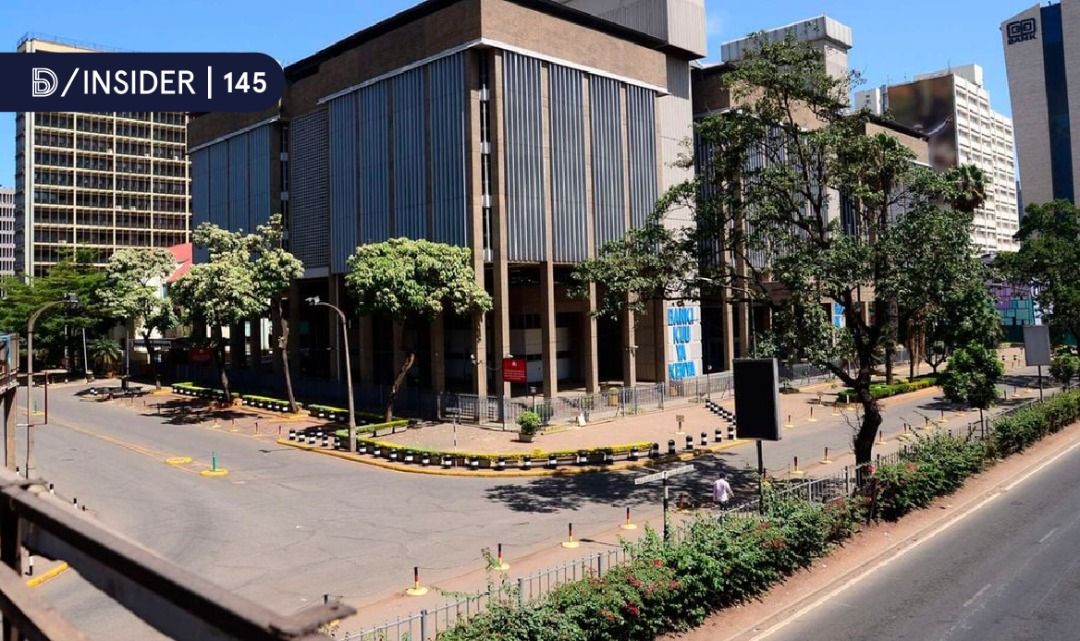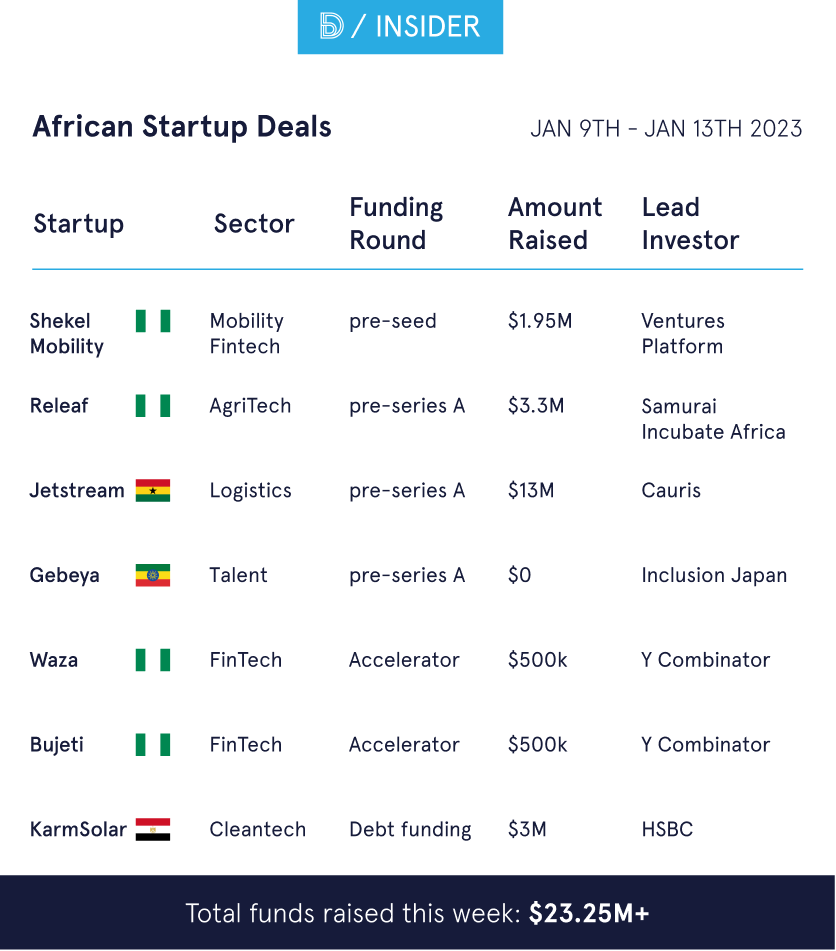BD Insider, Letter 145: USSD in Nigeria, M-Pesa in Kenya, who should pay?
Read our analysis on the Safaricom lawsuit by a Kenyan on M-Pesa charges, alongside our report on Ethiopia's internet shutdown woes and MTN Ghana's $773 million tax fine.

Despite pressure from federal lawmakers, banks and residents to extend the deadline, the Central Bank of Nigeria (CBN) is still counting down to the prescribed date.
In letter 145, we provide:
- a learned perspective into Kenya's M-Pesa charges and a customer's lawsuit
- the financial implication of Ethiopia's blackout
- MTN and its $773 million tax fine in Ghana
and other noteworthy information like:
- Zero To Scale (ZTS) featuring Healthtracka co-founder and CEO
- the latest African Tech Startup Deals
- opportunities, interesting reads and more
The big three!
Kenyan Court halts re-introduction of M-Pesa charges
The news: A Kenyan High Court has asked Safaricom and the Central Bank of Kenya (CBK) to pause the re-introduction of M-Pesa charges for transactions involving a bank account. This injunction is expected to last until an existing lawsuit by a Kenyan is concluded.
Background: During the coronavirus pandemic, the CBK waived certain mobile money transaction charges to reduce the need to hold and exchange cash—which could be a vector of the disease.
Almost three years later (with effect from January 1, 2023), the Bank re-introduced the charges to "facilitate a transition towards sustainable growth of the mobile money ecosystem and ensuring affordability of payment services for Kenyans".
Exchange rate: Ksh 1.00000 = $0.00815
Zoom in: Moses Wafula, a Kenyan, doesn't believe that individuals should be charged for transactions from their mobile money wallets to a business on M-Pesa. So, he filed a suit to challenge the reinstatement of the charges on M-Pesa.
"...the engagement between Safaricom and its Mpesa Paybill clients...is a bipartite business engagement between Safaricom as the M-Pesa paybill service provider and their M-Pesa paybill primary clients being the service recipients," he says, as cited in The Nation Africa.
Zoom out: We see what Moses is trying to achieve with his suit, but we do not expect it to hold water.
Mr. Wafula is attempting to dictate to a service provider how to run its business. He does this by distinguishing a customer from a beneficiary. In this case, the merchants or banks who make use of the M-Pesa Paybill service is the customer while the individual who pays for goods and services using the Paybill service is a beneficiary of the Paybill service.
What Moses fails to appreciate is the fact that a business, like Safaricom, can have two customers within a business transaction. This lawsuit in Kenya is reminiscent of the USSD troubles between telecom providers in Nigeria and Banks (or OFIs). On one hand, banks and OFIs set-up a USSD service (e.g *737#) on a telcos' network while individuals make use of the USSD service to complete transactions.
Who should pay for such service—the individual using the USSD service or the business/bank who uses it to collect payments?
Safaricom's Paybill Tariff model allows the business to determine whether the transaction charge should be split between themselves and their customers (MGAO) or for either party to wholly bear the charge.
In the case of Nigeria, some telcos ask the businesses (in this case, banks) to pre-pay for the service on behalf of their customers or the telco does direct carrier billing to the business' customer.
The decision of the High Court would prove instructive for future models of telco, bank partnership to offer services to consumers on a telecom's network.
Moses Wafula's case will be mentioned in court on January 23, 2023.
Ethiopia lost $146 million in 2022 due to internet shutdowns
The news: Due to the ongoing civil war in Ethiopia, the country has continued to experience internet shutdowns. As a result, businesses have lost $145.8 million, according to a report from Top10VPN. Top10VPN is a UK-based VPN review firm that assesses internet privacy, security, and freedom.
In 2020, the country lost $100 million to internet outages which rose to $164.5 million in 2021, affecting 21.3 million users.
Why it matters: Samuel Woodhams, a digital rights researcher at Top10VPN told Quartz that repeated shutdowns are not good for Ethiopia and they "could have long-term consequences, with a drop in foreign investor confidence and a decline in local tech-driven growth."
Zoom in: There has been an internet blackout in war-torn Tigray region, since late 2020. The extended internet outage has made it difficult for human rights groups to document what’s been described as "crimes against humanity and ethnic cleansing" taking place in the region.
In November 2022, Belete Molla, Ethiopia’s Minister for Innovation and Technology told delegates at the UN annual Internet Governance Forum in Addis Ababa that "there is no timeline" to the restoration of the internet in the region.
Ghana imposes $773 million tax fine on MTN
The news: Ghana Revenue Authority (GRA) has asked Scancom PLC (MTN Ghana) to pay a $773 million fine for "deceitfully" underpaying its taxes.
According to MTN Ghana's analysis, the GRA infers that MTN Ghana under-declared its revenue by more than approximately 30% over the five-year period from 2014 to 2018.
Background: The GRA commenced an audit of MTN Ghana in 2019 with the objective to give assurance on the reliability and completeness of revenues declared by MTN Ghana for the purpose of tax computation for the period 2014-2018.
"The GRA had not issued MTN Ghana with any prior guidelines and standards relating to the new call data records (CDR) sequence-based methodology used for the audit," the telecom said in a statement. "In May 2021, after consultations and discussions between MTN Ghana, MTN Group, the Ministry of Finance of the Republic of Ghana and the GRA, the parties agreed to an independent review by a global professional services firm."
What's next? The South African telecom company–which is one of the largest private sector taxpayers in Ghana—said it "strongly disputes the accuracy and basis of the assessment, including the methodology used in conducting the audit,...we will continue to engage with the relevant authorities on this matter and MTN remains resolute that MTN Ghana is a tax-compliant corporate citizen".
In 2020, MTN Nigeria came out victorious in a 16-month battle with the government that claimed the telco owed $2 billion (₦1 trillion) in back taxes.
More recently, Vodacom has been embroiled in a controversial tax demand in the Congo that saw the government seal parts of its offices and freezes of its bank accounts.
Zoom in: Ghana, which lost access to the international capital markets due to its ballooning debt and loan service costs, suspended interest payments on its external debt last month. The nation is trying to restructure its obligations to finalise a $3 billion bailout from the International Monetary Fund.
📽️ How Healthtracka went from Zero to Scale
At the climax of the COVID-19 pandemic in 2021, Ifeoluwa Dare-Johnson and Victor Amusan (Head of Product) founded Healthtracka to provide home testing services for individuals and organisations.
Unlike the conventional labs, the Nigeria-based healthtech provides test results within 48 hours. In this episode of Zero to Scale II, Ifeoluwa talks about starting Healthtracka, its $20k milestone and how the company has been able to scale and sustain its growth.
💰 State of funding in Africa
Quick insights:
- Last week, Catalyst Fund—a tech accelerator and pre-seed venture fund—managed by BFA Global announced that it has invested $2 million into 10 African startups building solutions to improve the resilience of climate-vulnerable communities on the continent.
- In an updated list, Y Combinator has listed three African companies—Bujeti, Shekel Mobility and Waza—as part of the 2023 winter cohort. In line with YC's standard deal, each of these startups will receive $500,000.
- Check the table below for more insights on the venture capital activities between January 9-13, 2023.

📚 Noteworthy
Here are other important stories in the media:
- Soyombo's Voltron Africa invested in one startup every week of 2022: Could Olumide Soyombo's Voltron Africa have been the most prolific local VC firm on the continent for 2022? Benjamin wrote an analysis of how the firm invested in 53 startups last year.
- How to set up your Starlink hardware in Nigeria: Oluwadara writes a step-by-step guide on how to purchase and set up Starlink hardware kit in Nigeria.
- Flutterwave wants to acquire UK fintech, Railsr: Flutterwave and a consortium of existing Railsr investors want to acquire Railsr, a British fintech company in what is described as "heavy competition".
- Facebook's Africa partner, Sama quits content moderation operations: Starting March 2023, Kenya-based Sama, a third-party contractor for Meta—Facebook's parent company has announced that it will discontinue its content moderation operations for the big tech.
- Starting February 2023, Google will charge 16% VAT on ads in Kenya: The Kenyan government through a new regulation has required global technology companies including Google to charge Kenyan users a 16% VAT on their services.
💼 Opportunities
Jobs
We carefully curate open opportunities in Product & Design, Data & Engineering, and Admin & Growth every week.
Product & Design
- Jetstream — UI/UX Designer (Lagos)
- Canonical — Head of Design (Accra)
- Sweatcoin — Design Lead (Remote)
Data & Engineering
- Flutterwave — Integration Engineer (Nairobi)
- Jetstream — Jnr Frontend and Backend Engineer (Tema)
- Stears — Data Analyst and Engineering Manager (Lagos)
Admin & Growth
- Mainstack — Community Manager (Remote)
- Caret — People Operations Specialist (Lagos)
- Piggyvest — Customer Success Associate (Lagos)
Thank you for reading. Please let us know if you liked this newsletter.







Comments ()